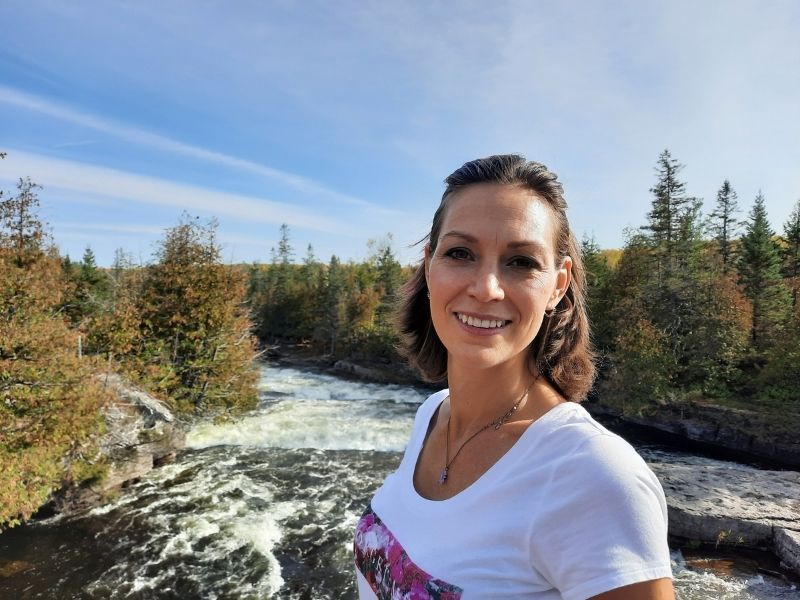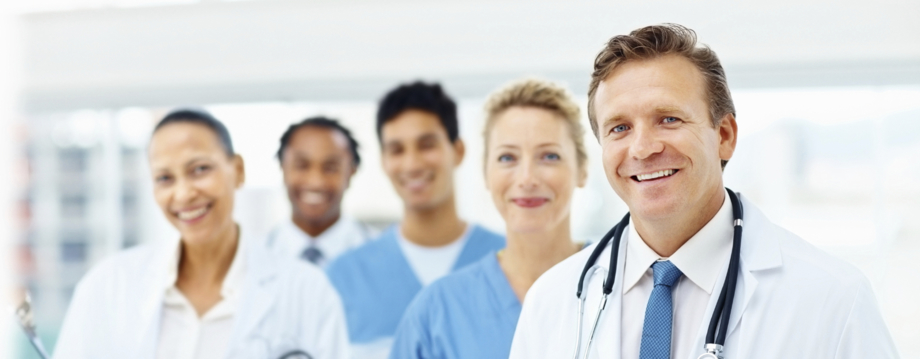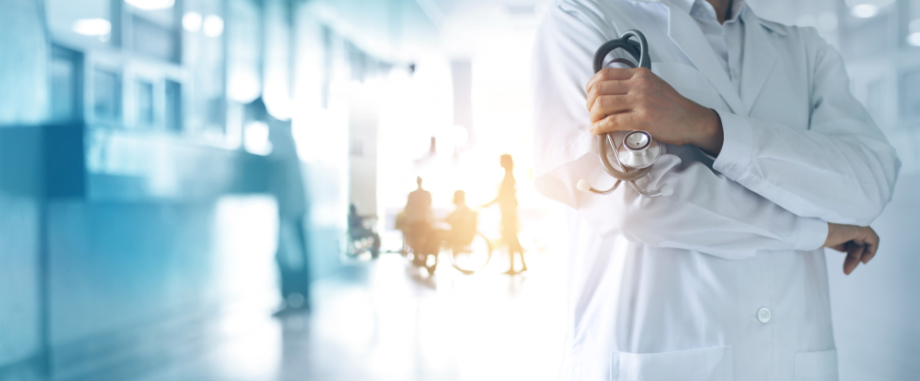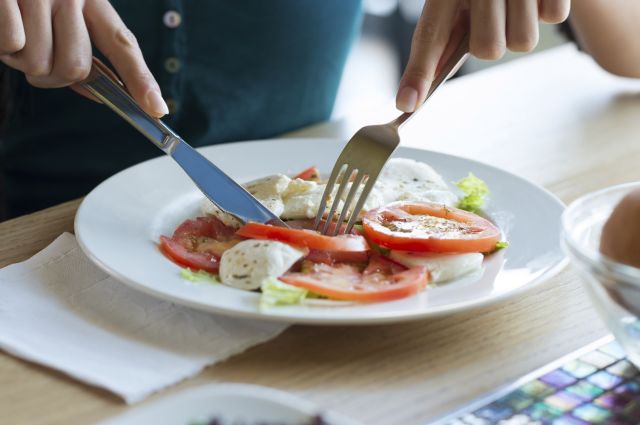We interviewed Elly, a young adult breast cancer thriver who leads yoga and meditation sessions for the IHC community. Check out her most recent session here: Elly's April Meditation Session.
IHC: What is your cancer diagnosis story?
E: Cancer is in my family. My brother died from brain cancer when he was only 4 and I was 7. Since then, I’ve always tried to be healthy and have an active lifestyle, just in case. Still, I got cancer.
In 2018, an old shoulder tear injury resurfaced, which caused a cyst to develop in my armpit. When I had the cyst checked out by a doctor, it was completely benign. They insisted on also doing a mammogram and a breast exam since the cyst was close to my breast. The tests revealed a few calcification spots in the right breast and the breast exam revealed nothing. I was offered a biopsy but chose to wait 6 months for another mammogram. When I returned for the follow-up mammogram, the calcification spots had disappeared. I originally thought “Yay, the spots are gone!” But the doctors told me, “No, that’s not how it works. If the calcification spots don’t show up, there’s a problem.” A biopsy and an ultrasound were scheduled.
Soon after the biopsy of the calcification spots in my right breast, a lymph node in my right armpit swelled up. I then went for an ultrasound the following week and pointed out this inflamed node to the doctor during the appointment. To my surprise, they were able to biopsy the node right there and then! Although I was really lucky to have my node biopsied so quickly, the rest of the appointment was very demoralizing and scary. As the doctor passed the ultrasound wand over the upper part of my right breast, the ultrasound screen suddenly became a blizzard of snow, a blizzard of white cancerous spots. My jaw dropped. Both the doctor and I became instantly quiet. I was in shock because the only prior evidence I had were the tiny calcification spots. Following this, the results of my breast biopsy became available and I was told I had cancer. I was then scheduled to do an MRI and CT scan which found a tumor that was 4.5 cm by 2.5 cm by 3 cm, which is quite large for a tumor you can’t even feel. The mammogram had only shown the tail end of the tumor that fit into the machine since the tumor was close to my chest wall.
At this point in 2019, I was officially diagnosed with breast cancer. The cancer was estrogen positive & progesterone positive (ER+, PR+, HER2-). It was on the right side of my body in the right breast and right armpit.
The ultrasound screen suddenly became a blizzard of snow, a blizzard of white cancerous spots.
IHC: How did you initially react to this diagnosis?
E: My initial reaction to my diagnosis was denial, sadness, and anger. I went through the 5 stages of grief. I was in denial and just wanted to turn back time to before I was diagnosed. I was angry that this had happened to me after working hard to live a healthy lifestyle. Even though my brother’s cancer is not genetically connected to mine, it brought back a lot of sad memories and sad emotions from that time in my life and I was depressed. I also tried to negotiate with God/the universe to take this cancer away.
Eventually, I just had to accept the diagnosis, turn to a greater power for strength, and let go of the anger, the denial, and the negotiations.
IHC: What treatment did you complete after this initial diagnosis?
E: I did three rounds of chemo and my lymph node shrunk back to normal size. The doctors did an MRI to see if I would even need to complete the other three rounds I had been scheduled for, and the MRI came back clean. I was elated by this news and excited to be able to move ahead with a lumpectomy and sentinel node dissection ahead of schedule to finally remove the cancer.
When the cancer biopsy results were available, I was devastated to find out that the tumor and nodes all came back cancerous. The MRI was a false negative and I still had quite a bit of cancer left inside of me! The MRI had missed a few ~1cm tumors in my lymph nodes and a 3cm tumor bed. This threw me into a state of shock and trauma because I couldn’t even trust the results from the MRI.
I was sent back for emergency surgery, a right axillary dissection to remove all the lymph nodes in the right armpit. All 9 removed lymph nodes came back cancerous. I thought the cancer was gone from my body, but my body was still full of it. I felt so panicked as I believed no one could tell me if there was truly any more cancer in my body or not. The doctors claimed to have gotten all the cancer cells with the second surgery, but how would they know if the MRI and other scans couldn’t pick it up?
I was put back on chemo for 3 more rounds, but I only was able to complete 2 rounds before my neuropathy became so bad that I couldn't feel my fingers. I then proceeded to have 25 rounds of radiation before being sent home to “recover.”
I felt so panicked as I believed no one could tell me if there was truly any more cancer in my body or not.
IHC: What happened in this initial “recovery” phase for you?
E: The doctors said that over the next few months, I should recover and things should get easier. I felt like I was getting worse every day. It was almost like the chemo, radiation, and all the toxins put in my body to get rid of the cancer took a severe toll on me. I had terrible muscle and joint pain, I was emotionally unstable and crying all the time. I was completely broken: in body, mind, and soul. I spent so much time in bed during this period that my bum was sore from lying down. I didn’t even know that this could happen.
Math has always been my strong point and I have a degree in electrical engineering. After cancer treatment, I couldn’t do mental math above 10. Realizing that adding 7+5 was almost impossible for me was another huge emotional low. It became obvious to me that I couldn’t return to my engineering job although I had worked so hard for this career.
It’s almost like your brain slows down AND your neurons don’t communicate well with each other anymore. One morning I got up and it was almost like my brain forgot how to walk. The left leg went but when my brain gave the automatic command for the right leg to go, it didn’t go. I just remember falling and thinking “I’m falling, cmon leg, move, move, MOVE!” My leg ended up moving and I caught myself at the last second, but it was so weird. I was sending commands to my body and it wasn’t responding.
It was such an intense feeling to realize how much damage had occurred to my brain.
IHC: How did you start to heal your body from this point?
E: I had to start learning how to live in a completely new way.
I’d been doing yoga for about 15 years already, but it was just stretch yoga as a part of my regular workout routine. I wasn’t using it for meditative purposes. When my joints were in pain from chemo and my brain was too foggy to keep track of anything, I decided to turn to yoga and meditation. This time, from a completely different perspective.
I really delved in full-force online to teach myself meditation. Meditation helps the frontal lobe of the brain, which manages our emotions. Soon after I started meditating regularly, I stopped going through such intense mood swings. No longer was I going into a store and randomly bursting into tears. I stopped having as many emotional breakdowns and was able to work through a lot of the mental trauma that cancer had inflicted on me. I was able to find my inner joy, bringing my body into a parasympathetic state that promotes natural healing, relaxation, and recovery.
Regarding yoga, an alternative care cancer center in my city introduced me to lymphatic yoga at the beginning of my cancer journey. The classes taught there showed cancer patients lymph yoga techniques that could be done at any time, even from your bed. I had used these techniques when one of the lymph nodes in my thyroid started to swell during chemo. At the time, I initially panicked because I couldn’t bear having another problem, cancer was enough! Then, I remembered the lymphatic yoga techniques for the neck and proceeded to do them right away for 30 minutes. The next day, the lump was gone and I was thrilled. As a result, lymphatic yoga was something that I did for at least 40 minutes every day throughout those last few rounds of chemo and then reintroduced during my recovery.
When doing research about meditation and yoga, I came across a wide variety of experts. For me, different experts will be able to help you with different things, and not every type of meditation or yoga is for everyone. I found the experts to help me and created my own program combining techniques to help relieve the problems I had because of chemo, surgery, and radiation. Stretch yoga relieved my intense joint pain. Lymphatic yoga flushed out toxins. Meditation helped me to find my inner self, find my inner joy, improve my focus, become emotionally stable, and tap into my parasympathetic natural healing state.

IHC: How has your relationship with yoga and meditation changed over the years?
E: I used to use yoga for exercise only, now I use it for healing purposes, such as regaining the elasticity in my muscles and relieving pain. One of the many difficult things I was struggling with after cancer was urinary incontinence. The chemo and radiation caused the muscles in my pelvic floor to become tense and weak and to not function properly. I kept having accidents, which was mortifying for any young adult woman. Yoga allowed me to loosen and strengthen these muscles in order for them to function properly, which greatly improved this issue.
No one tells you about all these side effects. I was at home with no tools and no one to help me deal with this. This is what led me to do all this research.
IHC: How did yoga/meditation help you when you were diagnosed?
E: In June 2021, I was diagnosed with breast cancer for the second time, but this time in a lymph node on the left side of my body. This was the exact same cancer, it had metastasized!
I always had it in my mind, from a statistical point of view, that the cancer was still in me because all lymph nodes removed in 2019 had cancer. I didn’t want it to be true, but I felt like I already knew. Immediately, I knew that I wanted to do everything in my power to not fall into another state of trauma. I started meditating for two hours a day every day to put my body into a state of healing and relaxation. I did this for a good two months straight. This was very difficult, but it was the one thing I made sure that I did.
Cancer was in my lungs, lymph system, liver, bones, left breast, and eyes.
My cancer spread very quickly. In a few months, I had a fractured rib from cancer eating away at it, tumors in my left breast, cancer in my lungs, a swollen lymphatic system throughout my body, and trouble breathing. Cancer was also in my liver, hip bones, shoulders, spine, and eyes. I refused to give up, kept taking my medications, meditated more, did lymphatic yoga, and ate even healthier.
Now, they can’t find cancer anymore. I’m still on estrogen suppressants that affect my brain a lot, but I am so much better than I was before. Another benefit of this healthier lifestyle now is that I don’t have swollen legs, joint pain, hair thinning, skin rash, mouth sores, vision issues, and liver and kidney issues that my current medication was supposed to cause. Doing meditation and yoga and other healthy activities have helped my body be free from these side effects.
Different yoga and meditation techniques worked better for me during different stages of my cancer journey. Finding your solution at each stage of your journey and situation is important.
IHC: Did you do anything else to complement your body’s healing at this time?
E: I created my own ketogenic-esque diet to complement my body’s healing. I eat very little carbs, I consume almost no sugar, I take supplements daily, and I try to put my body into a state of ketogenesis so that I can create energy for my body through fats instead of sugars and carbs. I also eat like a diabetic, so I make sure that the fruit that I eat is on the low glycemic index. I stay away from root vegetables as well because they are high in carbs. I make the majority of my meals from scratch. I mostly eat nuts, eggs, fish, broccoli, kale, cauliflower, and berries. I don’t eat any grains, instead, I use coconut flour or almond flour to make bread. The diets, again, complement my medical treatments and allow me to support my body as it tries to restore and recover. The way I see it, I try to eat food that is very nourishing and easy to digest so that my body’s energy is mostly spent on my immune system resolving cancer, and less on digesting food.
After starting this program, I’ve noticed a serious difference in my digestive system – it feels lighter. Everything is so much better than it used to be. Recently, I found out that I am severely Celiac and also allergic to corn. When you’re Celiac, gluten inflames your intestines and prevents you from absorbing nutrients. Then, the unabsorbed carbs ferment in your intestines, giving out toxins and poisoning your body – this is how my doctor explained it to me. Even though I was eating well before I started this regimen, I was still poisoning my body due to a disease that I didn’t know I had. Also, I found out that my cancer is fed by insulin, and insulin is produced in your body when you consume sugar. Since I am eating a lot less sugar and my body isn’t producing as much insulin, this results in starving my cancer twice by not feeding it sugar or insulin.
I was still poisoning my body due to a disease that I didn’t know I had.
Since our culture is so ingrained with carbs and sugar, it was difficult to adjust my diet. But, I am so much better off because of it. My digestive track feels so much lighter, it’s more relaxed, and I don’t get any more cramps, which used to be painful.
I also discovered through a genetic test after my second cancer diagnosis that my body doesn’t methylate well, which in my case results in my body poorly excreting excess estrogen. I have estrogen cancer, surprise! So now I take folate, a supplement to support proper estrogen elimination through the ‘methylation’ pathway. As well, I recently learned that plastics, pesticides, and chemicals contain xenoestrogens (xeno = foreign), which can be toxic to our bodies. Therefore, I have reduced my xenoestrogen exposure by not using plastic containers, by using a pesticide wash on all my fruit and vegetables (or buying organic food when possible), and by breathing clean air free from toxic chemicals.
Currently, my cancer is undetectable. Which we know from before is not always accurate for me. But, by listening and being in tune with my body, I feel that I can trust that my body is healthy. I have improved my digestive system so much, which inherently boosts my immune system, and I am in tune with my inner self through meditation.
IHC: What are other ways that you relieve stress and anxiety?
E: Another way that I relieve stress and anxiety is through dancing and singing! I love putting on an uplifting song and singing & dancing away, feeling alive and unleashing my inner joy. Inner joy, happiness, and finding a stress-free state for ourselves are so important in helping the body restore itself.
Another method I use is saying affirmations to myself. I have a quote from Louise Hay. “All is well, everything is working out for my highest good, out of this situation only good will come, and I am safe.” Whenever I am feeling particularly anxious or stressed, I will repeat that quote until I regain control of myself. I can't control every situation, but I can control my reaction to whatever is happening around me.
IHC: What is one situation where you used yoga/meditation to center yourself when you were overwhelmed?
E: When I was diagnosed with cancer for the second time, I used deep breathing and meditation to not go into a state of panic and trauma again. Instead of panicking, I meditated and reflected on “What does this mean, and what do I need to do?” There came a point where I was open to everything and, more importantly, truly open to listening to what my body needed. It wasn’t like the first time I was diagnosed at all. Because of meditation, I was able to stay level-headed and go through treatment, figure out a new daily routine, read informative books, and put all the information together into a plan for myself to heal & recover.
IHC: What are some of the best benefits of yoga/meditation to you?
E: Lymph yoga helps me flush out the toxins from my body – including my brain to help with chemo brain or brain fog. Stretch yoga helps me loosen and regain elasticity in my muscles which relieved my joint pain and improved my incontinence issues, and it helps me strengthen my muscles – all things I struggle with because of cancer treatments.
Meditation helps me with my emotional management. I went from crying over nothing to being relatively emotionally stable. It helps me improve my focus and memory, something I struggle with because of chemo brain. It puts my body into its parasympathetic state, which helps me fight cancer, even as cancer was destroying my bones, and heal more quickly. Chanting meditation & EFT Tapping also help me overcome trauma by allowing me to release negativity trapped in my body from the bad past experiences.
It puts my body into its parasympathetic state, which helps me fight cancer, even as cancer was destroying my bones, and heal more quickly.
IHC: What types of meditation do you teach?
E: In my Reactivate Myself program, I teach quiet, guided, visualization, and chanting meditations. I also partner with someone who does videos for EFT meditation. All of these things have come together to truly benefit me during the worst parts of my cancer journey.
IHC: What would you say to others who are on their cancer journeys?
E: Don’t lose hope because there is always hope.
Every day that you wake up is a great accomplishment. Be grateful for every single day.
Find a practice that enables you to relax or bring you joy and add it to your daily routine. Whether it be meditation, walking, running, yoga, reading, or cooking, find something that works specifically for you and do it.
Being told you have cancer and going through treatment is extremely traumatic for the body, mind, and soul. Waiting for time to heal me didn’t work for me. If you’re like me, I recommend that you find a daily practice that addresses recovery for your body, mind, and soul to make real progress on your journey. That’s what I did and it worked! Yoga, meditation, and dancing have become tools I use to be my best self and to help in times of struggle.
















